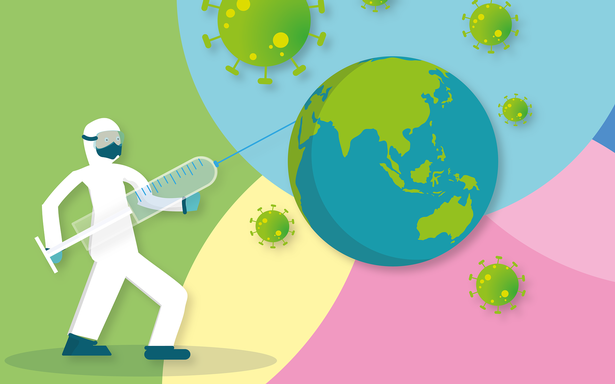The rollout of COVID-19 vaccines in the United Kingdom and later in Canada and the United States is certainly a momentous milestone after a tough year. Amidst these developments, it is still not clear when the least developed and developing countries could get their hands on these potential life-saving vaccines. Most of these countries will have to depend on an effective functioning of the existing multilateral frameworks to vaccinate their populations.
The advent of multilateralism post World War II ushered in several benefits to the international economic system, with global partnerships as a metric to democratise international relations. However, multilateralism tends to operate within the realm of state realities. Hence, the inherent inequalities often act as a constraint. None more so during a public health crisis like the ongoing COVID-19 pandemic when international commitments have taken a back seat with no accountability.
For long, the U.S. was considered to be a global leader but the Trump Administration pushed its policies towards a nationalist agenda and a protectionist regime. Its decision to withdraw from the Paris Accord, backing out of World Health Organization, withdrawal from the Comprehensive Trans-Pacific Partnership are a few examples of it turning its back on the global community. Its ability to reposition itself both economically and strategically, without any threat of backlash is partially the failure of existing multilateral frameworks and more so, the capitalistic notions favouring the richer nations more than others.
Even when the global recession hit the word in 2008, its fallout took a toll on developing economies such as Argentina, Ghana, Ukraine, Mexico. The U.S., UK and Germany — even India, were better equipped to absorb its shocks and recover. The impact of the pandemic on different economies tells a similar story. In India, for instance, Reliance Industries was able to amass more wealth during the pandemic than ever when country’s migrant labourers were taking a long walk back due to a nationwide lockdown.
In this sort of global crisis, an acceptance that all human lives are equal, regardless of where they come from or belong, should take precedence over monetary considerations.
While earning potential has increased across countries with an increased emphasis on trade facilitation, its benefits have not necessarily percolated down to the weaker sections. The proponents of capitalism often fail to address the popular belief that the rich continue to get richer while the weaker sections languish. No doubt capitalism outperforms socialism in several key indicators, but its fecundity seems to be limited to the richer nations alone. Perhaps the flaws in the prevailing global economic structures are laid bare during a crisis, its impact felt harder by those who lack adequate means.
Make no mistake, my intent is not to measure the loss of human lives alone, which is attributable to health system failures, but to highlight how decisions by governments, corporations or international organisations seem to recognise the welfare of a chosen few over others that constitute the majority.
Regardless of when a crisis snowballs, its effects are felt by individuals, corporations and countries alike. I argue that those with means cope better and recover sooner than ones without means. The weaker sections tend to remain at the mercy of their economic betters, often left fighting for scraps.
The character of a crisis, health or otherwise makes no difference to the outcome. A capitalistic society remains skewed in favour of those who are able to exploit its weaknesses. For now, the numbers are not clear to conclude whether COVID-19 has widened the wealth inequality. However, the action taken by governments for cushioning citizens its impact has not been uniform.
With Pfizer and Moderna commencing emergency administration of the COVID-19 vaccine, reports suggest that 9 out of 10 in low-income countries may not have access to a vaccine during 2021. Meanwhile, Canada is assured of access to a COVID-19 vaccine and enough to vaccinate its population 5 times over. Vaccine-hoarding is a genuine threat for lower-income countries and thwarts their right to secure access to potential life-saving drugs. During the recent WTO TRIPS Council meeting on December 10, 2020, South Africa likened the bilateral procurement deals between rich nations to ‘Vaccine Apartheid’ enlarging ‘chasms of inequity’. Vaccine distribution channels appear to be benefiting the richer nations while the WHO’s COVAX initiative, a global partnership for ensuring fair and equitable access to COVID-19 vaccine, is unable to punch above its weight without any commitments from the U.S. and China.
The imbalance in global access to healthcare resources is threatening to extend to COVID-19 vaccination too. Out of the 12 billion doses of vaccines expected to be manufactured, 9 billion is already reserved for richer nations. COVAX, on the other hand has been able to secure only 200 million doses from Serum Institute of India, which is working with AstraZeneca, and a few 100 million more in the offing. The leading manufacturers, Pfizer and Moderna, claiming more than 90% efficacy, are providing for richer north while AstraZeneca, with around 70% efficacy, will be catering to COVAX.
Post World War II, multilateralism was seen as a key to harnessing synergistic capabilities of economic and human development. This seems to have disappeared during a global health crisis, the very time when it is supposed to deliver. Improving accountability within multilateral institutions offers a possible short-term solution but the absence of a constructive approach around ideas of capitalism and inequitable access to resources continue to plague the divide between the rich and the not-so-rich. In this sort of global crisis, an acceptance that all human lives are equal, regardless of where they come from or belong, should take precedence over monetary considerations.
Source: Read Full Article

